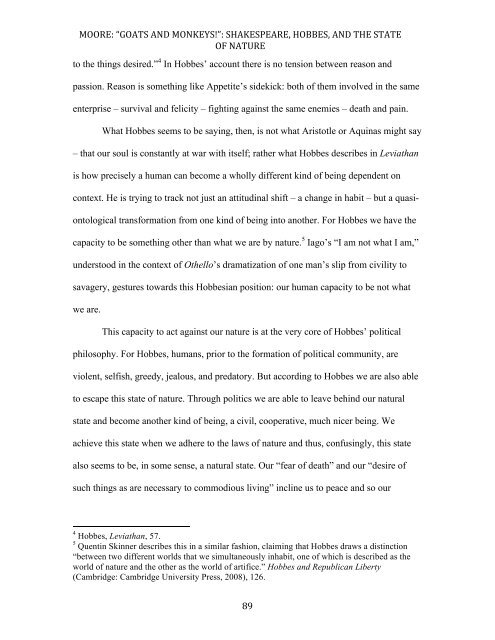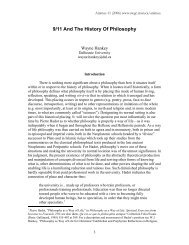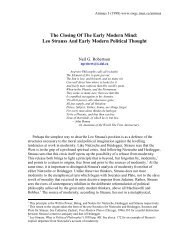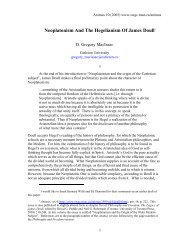âgoats and monkeys!â: shakespeare, hobbes, and the state of nature
âgoats and monkeys!â: shakespeare, hobbes, and the state of nature
âgoats and monkeys!â: shakespeare, hobbes, and the state of nature
You also want an ePaper? Increase the reach of your titles
YUMPU automatically turns print PDFs into web optimized ePapers that Google loves.
MOORE: “GOATS AND MONKEYS!”: SHAKESPEARE, HOBBES, AND THE STATE <br />
OF NATURE <br />
to <strong>the</strong> things desired.” 4 In Hobbes’ account <strong>the</strong>re is no tension between reason <strong>and</strong><br />
passion. Reason is something like Appetite’s sidekick: both <strong>of</strong> <strong>the</strong>m involved in <strong>the</strong> same<br />
enterprise – survival <strong>and</strong> felicity – fighting against <strong>the</strong> same enemies – death <strong>and</strong> pain.<br />
What Hobbes seems to be saying, <strong>the</strong>n, is not what Aristotle or Aquinas might say<br />
– that our soul is constantly at war with itself; ra<strong>the</strong>r what Hobbes describes in Leviathan<br />
is how precisely a human can become a wholly different kind <strong>of</strong> being dependent on<br />
context. He is trying to track not just an attitudinal shift – a change in habit – but a quasiontological<br />
transformation from one kind <strong>of</strong> being into ano<strong>the</strong>r. For Hobbes we have <strong>the</strong><br />
capacity to be something o<strong>the</strong>r than what we are by <strong>nature</strong>. 5 Iago’s “I am not what I am,”<br />
understood in <strong>the</strong> context <strong>of</strong> O<strong>the</strong>llo’s dramatization <strong>of</strong> one man’s slip from civility to<br />
savagery, gestures towards this Hobbesian position: our human capacity to be not what<br />
we are.<br />
This capacity to act against our <strong>nature</strong> is at <strong>the</strong> very core <strong>of</strong> Hobbes’ political<br />
philosophy. For Hobbes, humans, prior to <strong>the</strong> formation <strong>of</strong> political community, are<br />
violent, selfish, greedy, jealous, <strong>and</strong> predatory. But according to Hobbes we are also able<br />
to escape this <strong>state</strong> <strong>of</strong> <strong>nature</strong>. Through politics we are able to leave behind our natural<br />
<strong>state</strong> <strong>and</strong> become ano<strong>the</strong>r kind <strong>of</strong> being, a civil, cooperative, much nicer being. We<br />
achieve this <strong>state</strong> when we adhere to <strong>the</strong> laws <strong>of</strong> <strong>nature</strong> <strong>and</strong> thus, confusingly, this <strong>state</strong><br />
also seems to be, in some sense, a natural <strong>state</strong>. Our “fear <strong>of</strong> death” <strong>and</strong> our “desire <strong>of</strong><br />
such things as are necessary to commodious living” incline us to peace <strong>and</strong> so our<br />
4 Hobbes, Leviathan, 57.<br />
5 Quentin Skinner describes this in a similar fashion, claiming that Hobbes draws a distinction<br />
“between two different worlds that we simultaneously inhabit, one <strong>of</strong> which is described as <strong>the</strong><br />
world <strong>of</strong> <strong>nature</strong> <strong>and</strong> <strong>the</strong> o<strong>the</strong>r as <strong>the</strong> world <strong>of</strong> artifice.” Hobbes <strong>and</strong> Republican Liberty<br />
(Cambridge: Cambridge University Press, 2008), 126.<br />
89
















